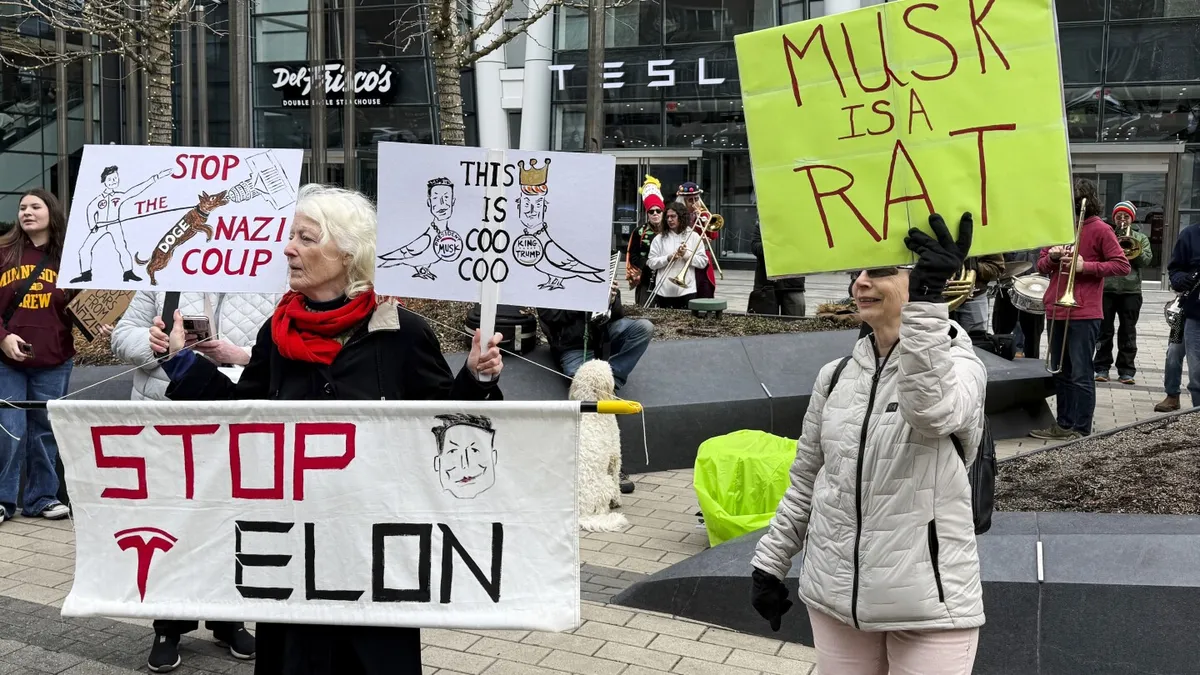
On Saturday, demonstrators gathered outside Tesla stores across the United States to protest against the automaker's billionaire CEO, Elon Musk, and his alignment with President Donald Trump in advocating for significant reductions in government spending. These protests are part of a larger backlash occurring in both North America and Europe, focusing on Musk's controversial influence in Washington. Critics of both Trump and Musk are attempting to discourage purchases of Tesla vehicles, the leading electric car manufacturer in the world.
Liberal groups have been mobilizing for weeks, orchestrating anti-Tesla demonstrations with the intention of rallying opposition to Musk's newly established Department of Government Efficiency. Their goal is to energize Democrats who are still feeling demoralized following Trump's victory in November. Nathan Phillips, a 58-year-old ecologist from Newton, Massachusetts, expressed his sentiments during a protest in Boston, stating, “We can get back at Elon. We can impose direct economic damage on Tesla by showing up at showrooms everywhere and boycotting Tesla, and telling everyone else to get out, sell your stocks, sell your Teslas.”
Critics argue that Musk is following directives from Trump to slash federal spending and significantly reduce the workforce, claiming that Trump's win provided both him and the president a mandate to restructure the U.S. government. The Department of Government Efficiency has rapidly accessed sensitive federal databases, directed thousands of job cuts, canceled contracts, and even shut down sections of the government, including the U.S. Agency for International Development.
Detractors contend that Musk's actions undermine Congress's authority over the federal budget and offer numerous opportunities for him to enrich himself. In addition to Tesla, Musk leads other ventures, including SpaceX, which conducts launches for NASA and the intelligence community, as well as the social media platform X. Neither Tesla nor the White House responded to requests for comments regarding the protests on Saturday.
More than 50 protests were scheduled across the country on Saturday, as listed on the website Tesla Takedown, with additional events planned for later in March in various locations, including England, Spain, and Portugal. Recent news reports have documented demonstrations in numerous U.S. cities, such as Tucson, Arizona; St. Louis; New York City; Dayton, Ohio; Charlotte; and Palo Alto, California. Some Tesla owners have even reported acts of vandalism against their vehicles, including graffiti with swastikas, which has raised concerns among Jewish groups about a potential increase in antisemitism. In one case, federal prosecutors charged a woman linked to vandalism at a Tesla dealership in Colorado, where Molotov cocktails were thrown, and the phrase “Nazi cars” was spray-painted on the building.
The atmosphere at Saturday's demonstration in Boston was described as festive, with a brass band playing music while protesters carried signs and chanted slogans. Many of the signs targeted Musk and the Department of Government Efficiency, one of which read: “Stop Elon and his despicable Muskrats.” Carina Campovasso, a retired federal worker, conveyed her frustration, stating, “This government led by Trump and Musk, it’s gone completely off the rails and we are here to stop that. And I hope they listen.”
Approximately 300 demonstrators protested outside a Tesla dealership in New York City on the same day. According to police reports, nine individuals were taken into custody, although details regarding the charges were not disclosed. Tesla's stock price has seen a decline of nearly one-third since Trump took office, although it remains higher than it was a year ago. As reported by Forbes, Musk's current net worth is estimated at $359 billion, with projections indicating a potential drop to $195 billion in 2024.
In summary, the protests against Elon Musk and Tesla underscore a growing discontent among various groups regarding the intersection of corporate influence and government policy. As demonstrations continue, the long-term effects on Tesla's reputation and Musk's business ventures remain to be seen.